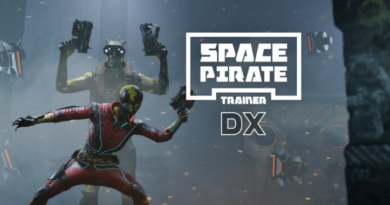Intellivision asks fans for more money, reveals massive Amico debts
[ad_1]

The Intellivision Amico’s wild ride as a possible video game console may soon come to an end, according to financial disclosures tucked into the company’s most recent fundraising announcement.
On Monday, Intellivision Entertainment Inc. began its fourth round of public prelaunch fundraising in less than four years. The fundraising campaign, which aspires to raise $5 million, includes an SEC filing that contains page after page of “risk factors” for the company going forward. While such disclosures tend to include broad statements of potential risk factors to cover all foreseeable catastrophes, Intellivision’s filing goes into brutal specifics about the company’s current debt—and suggests a clear timeline for the game console’s potential dissolution.
In particular, the company tells investors that it has “generated no revenues” since its formation in 2018, and its handlers predict Intellivision can only operate until July of this year at its current zero-revenue pace before needing to drastically change course.
Raider of a lost Ark (deal)
Amico began life when video game musician Tommy Tallarico acquired the Intellivision brand name in 2018, which had previously been attached to an early 1980s console made by toy maker Mattel. This was followed by Tallarico announcing Amico as a brand-new home console concept, which would use proprietary gamepads with a touchscreen, a disc-style d-pad, and Wii-like motion sensing—along with pledges that all Amico games would have console-exclusive content.
Years later, the company would sail past multiple announced launch windows, including an initial October 10, 2020, release date. Tallarico has muddied the promotional waters with so many misstatements and contradictions that retro-friendly forum AtariAge shut down its Amico subsection in late 2021. Although we’re left with an unclear picture of what really caused all these delays, Monday’s financial disclosures give us some clues.
On the manufacturing front, Intellivision now admits that it currently cannot account for $1.35 million paid to Ark Electronics USA, a Chinese electronics manufacturing firm with a headquarters in California. Monday’s disclosure blames this on a “contract dispute” without clarifying further, but Intellivision indicates that the company may not be able to recover either the cash or any console-making components that Ark has already purchased. This follows a September 2020 announcement that Ark had been selected to “deliver” Amico hardware; the announcement did not indicate any exclusivity for Amico production, but Intellivision has yet to announce any other manufacturing partnerships.
Our previous attempts to understand the hardware inside every Amico console suggested a sheer material cost around $100 for the system’s default SKU. This includes the console itself (whose system-on-chip resembles budget phones that retailed for $100 in 2016) and a pair of included gamepads. Estimating exactly how many consoles were attached to a $1.35 million order is tricky without a better look at Ark’s Chinese manufacturing plants and wholesale order prices, but rough math on the numbers we have thus far suggests orders in the 12-15,000 console range. (Previous public statements from Intellivision suggest roughly 6,000 Amico console preorders were placed worldwide by the end of 2021.)
Ark Electronics did not immediately respond to phone calls and emails about Intellivision’s claims. Spot checks of Ark’s online presence reveal an internal presentation which claims the company manufactured “100 million pieces per year” for a variety of largely Chinese electronics firms. That figure, however, doesn’t clarify which devices and accessories counted toward that annual 100 million count.
$100 sunk cost per Amico sold until further notice
The documents vaguely describe $9.5 million spent on “R&D investment funding, including hardware and software development” as of October 31, 2021, but Intellivision’s statement doesn’t clarify how much of that amount was spent on console components, exclusive software deals, salaries, or other considerations. Intellivision’s current $5 million request includes an estimation that 16.5 percent of that amount, or $825,000, will be dedicated to “finish[ing] games already in process.” Meanwhile, 13 percent ($650,000) will go toward “deposit payments in support of hardware manufacturing.”
But the request, as connected to a StartEngine fundraising campaign, doesn’t clearly earmark any of its $5 million toward paying down the company’s considerable debts. How considerable? According to the company, “long-term debt” is up to $7.2 million and “short-term debt” has reached $1.2 million. Those numbers do not account for some dismal interest payment arrangements, and they stand in stark contrast to Intellivision’s reported $429,000 in cash and cash equivalents.
One of Intellivision’s more unusual loan arrangements comes from the $810,000 owed to angel investment advisor Sudesh Aggarwal, whose name is spelled in multiple ways in the SEC filing. The arrangement demands Intellivision pay Aggarwal $100 for every Amico console sold until his entire balance is paid back. (Amico consoles have been presold at a price of $249.99 via both Intellivision’s official website and third-party retailers, though Intellivision announced this week that the console’s price could reach a point as high as $349.99.) This loan arrangement includes an expectation that the balance would be paid in full by December 31, 2021, though it doesn’t clarify what penalties Intellivision may incur for failing to pay a single penny of that amount by the end of last year.
Ten percent annual interest is attached to over $800,000 of Intellivision’s loans that remain unpaid as of press time. This figure is in addition to $1.6 million in convertible notes that bear 5 percent annual interest. Many of the listed loans include options for debtors to convert each $1 of remaining debt to “two shares of common stock having an exercise price of $0.28 per share”—which assumes any of the debtors listed are interested in having their cash obligations converted into Intellivision stock.
“There may never be a fully operational Intellivision Amico”
The SEC disclosure includes many other eyebrow-raising statements about risk factors. Intellivision’s new admission that it has “limited experience in pricing and marketing our products” runs counter to statements in 2021 about its combined staff including savvy game industry veterans. Formerly, Intellivision had auspiciously claimed that ex-Xbox luminary J Allard had remained on board as “global managing director” through 2021, despite Allard announcing his departure from Intellivision in mid-2020. (Eventually, Intellivision offered an amended statement to the SEC on this matter.)
While Amico advertisements, including a new video as part of this week’s fundraising campaign, have used a Wii-like pitch of simple games and family-friendly fun as a selling point, Intellivision admits that “consumer preferences for games are usually cyclical and difficult to predict, and even the most successful content remains popular for only limited periods of time, unless refreshed with new content or otherwise enhanced.” Gaming fans familiar with Nintendo’s path from the megaton, simple-game Wii to the disappointing Wii U could indeed point at that Intellivision statement and ask how Amico’s Wii-like sales pitch could possibly correct Nintendo’s infamous sales example.
Intellivision now suggests that it will sell some Amico games as non-fungible tokens (NFTs), but the company has yet to clarify what technology stack or console interface will support such verification systems, and the “risk factor” section does not warn investors that recent NFT promotional efforts in the gaming industry have led to consumer backlash and boycotts. The document’s section on risk factors does clarify that “there may never be a fully operational Intellivision Amico” and that such a scenario would be due to “a change in business model” should Intellivision decide that a physical Amico console launch would “not be in the best interest of the Company and its stockholders/members/creditors.” (That would certainly offer Intellivision one way to avoid paying Aggarwal $100 per console sold, should that condition remain in effect.)
All of this leads to a pessimistic rating from Intellivision’s auditor. The company’s inability to create revenue of note while racking up losses and its failure to secure a “committed source of financing” as of press time lead the auditor to believe the Intellivision’s only path forward as of press time is outside financing and fundraising.
And Intellivision clarifies that its $5 million request via StartEngine is not enough to keep the company operating at its current trajectory. Intellivision plans to launch an additional investment round, also to the tune of $5 million, via a Regulation D model. Intellivision says a combined $10 million funding total would “fund the company for approximately 7 to 9 months.”
[ad_2]
Source link




